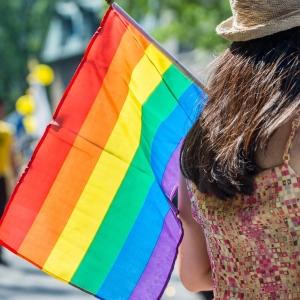The Impact of USC’s LGBT Health Equity Initiative on How We Research the LGBTQ Community
June 07, 2018- Research
Jeremy Goldbach, director of the USC LGBT Health Equity Initiative, discusses how he became involved in LGBTQ health research and HEI’s accomplishments to date.
Every June, Pride Month creates an opportunity for open dialogue surrounding issues that affect the LGBTQ community. Here at the USC Suzanne Dworak-Peck School of Social Work, we recognize the work of students and faculty who have made important strides toward equality for LGBTQ-identifying individuals.
As director of the USC LGBT Health Equity Initiative (HEI) and an associate professor of social work, Jeremy Goldbach leads research into the physical, mental and emotional health of the LGBTQ community. Goldbach’s research focuses on the negative health effects of discrimination in the LGBTQ population and developing effective interventions to address these negative health outcomes.
We spoke with Goldbach about his work at HEI and the impact the current political climate has had on the LGBTQ community.
USC Suzanne Dworak-Peck School of Social Work: What initially drew you to your work with LGBTQ individuals at USC?
Jeremy Goldbach: My work is focused on how discrimination in childhood and adolescence interrupt healthy development later in life. I started to work with LGBTQ youth because of the profound disparities in health outcomes they experience. So, I was drawn toward trying to understand what exactly is unique about the discrimination that LGBTQ folks experience, and how we can intervene in a way that would most effectively address negative health outcomes.
Over the course of my time at USC, I’ve also been able to apply that developmental model to adults. In adolescence, the things we’re looking at are substance abuse, suicide risk, academic outcomes and the beginnings of mental health disorders, but in adulthood, the focus is often on job satisfaction, progress toward career goals and happiness in relationships. So my research has not been entirely limited to childhood and adolescence, as development is a lifelong journey.
USC: When you first took the helm of the Health Equity Initiative, what kinds of issues were you looking to address?
JB: Reflecting on the landscape of LGBTQ health research to date, I came to realize the extent to which HIV has dominated the conversation — often to the detriment of other health issues, from my perspective.
The overwhelming attention given to HIV has produced gaps in our research; for example, we know a lot about white gay men between the ages of 18 and 35, because that demographic — at least in the public view — was the primary group affected by HIV in the 1980s and 90s, so that’s where all the funding went. We have a major information gap when it comes to people of color, transgender people and youth. In addition, much of what we know about mental health and substance abuse in the LGBTQ community has been through the lens of HIV. So, thinking about mental health independent of sexual risk and substance use has been sparse.
We really need to start thinking of LGBTQ individuals as whole people—not just sexual beings—with many different factors affecting their health. The Health Equity Initiative was created in large part to begin to focus attention toward that need.
USC: How has the current political climate affected your work?
JB: There’s never a dull moment! So far, the current administration has been so disorganized in the realm of policy that it’s unclear what the impact of their decisions will be in the long run.
This administration, in particular, has pursued an approach of “statistical genocide,” which is the idea that if you don’t track people, they don’t exist, so you don’t have to deal with their problems. Previous administrations would sometimes fail to address obvious information gaps, but this administration is actively removing valuable data collection programs from existing tools like the census. This is particularly concerning because if researchers and policymakers don’t have a clear view of what’s going on, they can’t help guide policy to effect positive change.
USC: What have been some of the milestones of HEI’s work so far? What challenges have you been able to address?
JB: LGBTQ people experience disparities in literally every aspect of life; if there’s a disparity, you will tend to find more LGBTQ people there. This population is way overrepresented in child welfare, substance abuse and homelessness, to name a few. I think sometimes well-intentioned researchers looking into other topics will say, “Look how many LGBT people we have here! We should do a study about this.” I think that’s great, but it’s not necessarily an intentional line of research. I think we’ve done a good job at the USC Suzanne Dworak-Peck School of Social Work of establishing scientific inquiry as the foundational method by which faculty and students assess LGBTQ-related issues.
We’ve obtained funding to support our work and built a strong team of researchers. And we’ve done a great job of approaching LGBTQ health-related issues more holistically. We’ve also focused on engaging students at all levels—not just master’s and doctoral students, but undergraduates as well.
With that said, we’ve certainly faced challenges. When I first came to the school, I was the only faculty member whose primary area of focus was LGBTQ issues. Over the years, we have been fortunate enough to build collaborative relationships within the department and find colleagues willing to lend their expertise to this field. The LGBTQ community is undergoing something of a renaissance, and now is a critical time in history to be involved. It is exciting that USC is going to be at the forefront of this dialogue.
To reference the work of our faculty online, we ask that you directly quote their work where possible and attribute it to "FACULTY NAME, a professor in the USC Suzanne Dworak-Peck School of Social Work” (LINK: https://dworakpeck.usc.edu)
